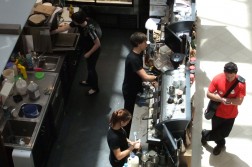It seems typical of life on this earth that just as we are basking in the afterglow of that joyous affirmation of all-that-it-means-to-be-human that is the Olympics, we get sucker-punched by a national crisis that reminds us all that ultimately our existence is fraught, fragile and depressing as hell.
This national crisis has been revealed to us by professional buzzkill Bernard Salt, who has written a book about Australia’s man drought. As Salt reveals, there is a serious imbalance between the numbers of 30-something single men and single women in Australia. Interestingly, the man drought in our 30s coincides with a "Sheila Shortage" in our 20s, thus demonstrating that there is no problem in this world that can’t be exacerbated by alliteration.
A man drought is a tricky problem, because the solutions we apply to other types of drought don’t apply. We can’t, with current technology, build a massive pipeline to carry men from the country to the city. Nor can we build a huge plant to convert seawater to men, or install tanks to collect men that fall from the sky. Perhaps one day, if our socialist government removes the intolerable obstacles to free enterprise, these things will be possible, but not today.
For now we have to watch helplessly as all those men flow into the sea, polluting our waters and choking innocent whales, thus condemning their children to a short, miserable life of boat-nuzzling and lethal injections. So you see how a shortage of bachelors can impact on all aspects of our society, provided you’ve been drinking heavily enough, which most women have been because they can’t find a man.
I am sure that some people will say that a man drought is not such a great catastrophe, that women can get along perfectly well without men, that the value of a woman is not dependent on her ability to attract a member of the opposite sex.
Well yes, that’s all adorably feminist, but show me a woman who doesn’t want a man, and I’ll show you Germaine Greer. And I don’t think either of us wants that. As any good Christian knows, man and woman were made from each other, and there is a very good chance that the man drought is angering God, and I think we’ve made God angry enough as it is, what with abortion and pornography and Gordon Ramsay and everything.
And what about these poor women, scrounging around for any man they can find? Do we want to see them fighting over the last few men left? Do we want to see them scratching and pulling hair and tearing clothes and wrestling in the streets? Obviously, in one sense, yes. But in another way, it’s unravelling the very social fabric. It’s terribly unseemly to see great troops of women roaming the city streets, invading our bars and nightclubs, forcing the endangered menfolk into dark corners with their loud laughter and bawdy girl-chat, rendering the male of the species irrelevant and powerless as we descend into a spine-chilling Lindsay Lohan-esque nightmare.
And what about the babies? We rail so vehemently against the killing of unborn babies, but have we considered the plight of those even more unfortunate children – the unconceived? How would you like it, if you never even got to exist, because your mother couldn’t find a man, because they’d all buggered off to drive trucks in the Pilbara? "Mummy, why was I never conceived?" "Oh, I’m sorry son, we couldn’t conceive you, because your father went mineral sands-mining and I never met him." Is that a conversation you want to have with your child?
What’s the solution? Well, this may be the one area of life in which rural Australia has something positive to offer. For just as our urban centres find themselves desperately short on males, in our backwaters the imbalance is just the other way. It’s not surprising that men gravitate to more remote lifestyles; we all know that one gender is naturally suited to tilling the land and hefting shovels, while the other is naturally suited to rave parties and working in call centres. In many ways, this ancient truth is at the heart of the whole problem.
This imbalance in some cases is quite extreme: Melbourne’s Herald Sun reports on the case of Nar Nar Goon, which may or may not be a real place, where there is a ratio of 12 single men to one single woman, and quite frankly she doesn’t look like she has the build to handle the workload. According to the story, dating guru Justin Parfitt suggests that the way for single country men to snare a lady is to "just feel good about yourself", which is all well and good, but when you live in Nar Nar Goon may prove an insurmountable task. No, more fundamental social changes are needed.
Somehow we must find a way to get all those single men out of the country and into the real world. Ironically, the drought itself is doing some good work in this area, forcing men off the land and into the soulless, straitjacketed urban existence we know as The Australian Dream. Not all desperate farmers move to the cities, of course; some shoot themselves, and that’s the sort of leakage we need to address with a slick targeted marketing campaign. "Put Down The Gun, Pick Up A Blackberry", that sort of thing. Play up the negatives of farm life, like manure, and emphasise the positives of city life, like ecstasy.
Alternatively, we can try to get the flow going the other way, pushing the women out to the country. Show them the benefits of a cow-intensive lifestyle, and the glamorous side of uranium mining. Or as a last resort, just pack them up in trucks and drive them out there. They’re mostly pretty small, it wouldn’t be that hard.
But one way or another, we have to do something to stop our country falling to pieces. We are about to spawn a generation of women, too unattractive to lure a decent man, not unattractive enough to move to Mount Isa, who will fall through the cracks of society and end up debasing themselves on The Farmer Wants A Wife.
And that’s a future we just can’t afford to countenance.
Donate To New Matilda
New Matilda is a small, independent media outlet. We survive through reader contributions, and never losing a lawsuit. If you got something from this article, giving something back helps us to continue speaking truth to power. Every little bit counts.



